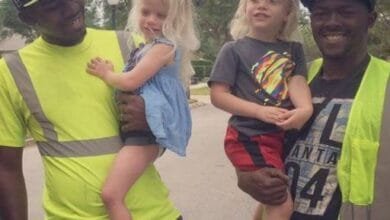Disabled Homeless Man Gave His Wheelchair to a Poor Boy Who Couldn’t Walk — 5 Years Later, the Boy Found Him to Repay His Kindness

Everyone at the city square knew me as “the flutist.” At 60 years old, I lived in the basement of an abandoned building and spent my days playing melodies on my old flute. I was homeless and had a physical condition that confined me to a wheelchair — a parting gift from my coworkers after I lost my factory job.
Back then, I started feeling intense pain in my legs and hips. I thought it was just aging until a doctor gave me the truth:
— “It’s a chronic, degenerative condition. There’s no cure. Pain medication might help, but your work will only make it worse.”
I begged my boss to move me to another department, but he shook his head.
— “You’re a great worker, but we can’t move you without certification. Company policy.”
That was it. My career ended, but the wheelchair became my most valuable possession — my support and freedom.
One afternoon, while playing my usual tunes, I noticed a tired-looking woman carrying a boy, about eight years old. The child’s face lit up at the sound of my flute.
— “Mama, please, can we stay? I’ve never heard music like this.”
She sighed, struggling to hold him.
— “Just a few more minutes, Tommy. We have to get to your appointment.”
I noticed she was carrying him because he couldn’t walk.
— “We can’t afford crutches or a wheelchair,” she whispered. “I carry him everywhere.”
In that moment, something inside me shifted. I remembered my own last day at the factory, the gift my colleagues gave me. I knew what I had to do.
Despite the searing pain in my body, I gripped the arms of my chair, stood up, and smiled.
— “Take my wheelchair,” I said. “I don’t really need it. It’s just an accessory. But it could change your life.”
— “We can’t accept that,” the mother protested.
— “Please,” I insisted. “Let this be my gift. Music isn’t the only thing I can offer.”
Tommy’s eyes widened.
— “Really, Mister?”
— “Your smile is enough of a thank-you,” I said, watching him joyfully test the wheels.
Five years later…
While playing a soft folk melody one morning, a shadow fell across my donation cup. I looked up and saw a tall, well-dressed teenager holding a long package.
— “Hello, sir,” he said with a familiar smile. “Do you remember me?”
He sat beside me and began to explain:
— “A few months after you gave us the wheelchair, we received an unexpected inheritance from a distant relative. With the money, we got medical treatment. Turns out my condition was treatable.”
— “And your mom?”
— “She started a catering business. She always loved cooking but never had the strength. Now she’s living her dream.”
Then he held out the package.
I unwrapped it and gasped. Inside was a beautiful, new flute case. On top, a handwritten note:
“PAYMENT FOR THE PAIN YOU HAVE EXPERIENCED ALL THESE YEARS BECAUSE OF YOUR KINDNESS. Thank you for showing us that miracles still happen.”
I sat there for a long time, holding the note and thinking of all the painful steps I had taken since giving up that wheelchair.
But I also thought about Tommy’s smile, his mother’s tears of gratitude — and how their lives had changed.
“One act of kindness,” I whispered, as the daylight faded through the basement window. “That’s all it takes to start a chain reaction.”





